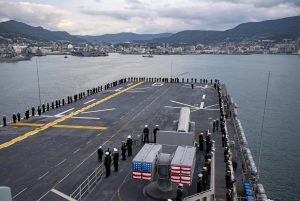On January 19, the United States and Japan celebrated the 60th anniversary of the signing of the U.S.-Japan Mutual Security Treaty. Preceding the anniversary, Washington and Tokyo issued a joint statement on January 17 in which the two governments declared that the U.S.-Japan alliance is “stronger, broader and more essential than ever” and announced the two governments’ “unshakable commitment to strengthen the Alliance.”
However, as the two governments celebrated 60 years of the foundation of the alliance that both sides have referred to as “the cornerstone for peace and stability in Asia,” there is a dark clown looming over the horizon. The two governments will enter negotiations to renew their five-year Special Measures Agreement (SMA), commonly referred to as “Host Nation Support,” later this year, and a U.S. State Department spokesperson has already indicated that the United States will push Japan to increase their HNS in the upcoming renewal negotiation.
Given how the U.S.-Republic of Korea (ROK) negotiation to renew their bilateral SMA went down last year, Japan should be concerned. On December 31 2019, the U.S.-ROK SMA — an agreement that spells out how much ROK government pays to support U.S. troops stationed in South Korea — expired. The breakdown came after both sides had initially failed to renew the SMA for the usual five-year term in December 2018, only agreeing to a year-long stopgap measure. The lapse in the SMA is due to the failure of both sides to find a way to bridge the big gap between their respective original negotiating positions. The United States was reportedly seeking for the South Korean government to pay up to $5 billion annually — more than five times what Seoul paid in 2019. On the other hand, the ROK government, while balking at the initial numbers presented by U.S. side, so far has not been able to work with the United States to come up with a mutually acceptable solution. Although the both sides have re-engaged in the negotiations this month, it is far from certain on what terms the two sides will be able to agree, or when such an agreement might come.
Why Tokyo should be worried? The first reason is the U.S. negotiating posture vis-à-vis South Korea. Even when the renewal of that SMA was deemed to be in jeopardy, Washington decided to break off the negotiations in November 2019, with only one follow-up session (that has been publicly reported, anyway) in December 2019. In other words, the United States demonstrated no sense of urgency even in the 11th hour to prevent the SMA from expiring. This suggests that the United States might take a very similar negotiation posture vis-à-vis Tokyo, willing to let the SMA with Japan expire if Washington does not feel confident that the both sides can reach a mutually acceptable agreement.
What gets even trickier for Japan is that Tokyo will be negotiating the renewal of its own SMA in the middle of the U.S. presidential election, with the incumbent U.S. President Donald Trump actively campaigning for a second term. Trump has often talked about how U.S. allies should pay the costs for stationing U.S. troops in their country. His demand for all U.S. allies to “pay more” to host U.S. troops is often quantified as “cost plus 50” (meaning 100 percent of the cost of stationing U.S. troops in the host country plus 50 percent). In fact, the United States’ tough negotiating position vis-à-vis South Korea in the U.S.-ROK renewal negotiation is intimately linked to what Trump himself would consider a “fair” cost-sharing arrangement between the United States and its allies.
Of course, there are a few things that work in Japan’s favor. One is the level at which Japan has already financially contributed to offset the costs of stationing U.S. forces in Japan. Under the current SMA, Japan pays 100 percent of the salaries of Japanese citizens who works in U.S. bases across Japan, 61 percent of the annual utility costs, and 75 percent of training relocation costs. Additionally, Japan shares the cost of facilities improvements in U.S. bases through the Facilities Improvement Program (FIP) as well as making financial contributions to the relocation of U.S. military bases, including the construction of a replacement airfield for Marine Corps Air Station Futenma and the relocation of III Marine Expeditionary Force to Guam. Simply put, even though there is no precise definition of “cost-sharing” that is bilaterally agreed upon, Japan does make considerable financial contribution for U.S. troops in Japan.
Furthermore, by having been able to observe the U.S.-ROK SMA negotiations for the last couple of years, Japan has had the time to learn from that example. Japan can take time to formulate its negotiating position by watching how the U.S.-South Korea talks went down, maybe even incorporating some “lessons learned” from their observations. Given that the formal negotiation are not anticipated to start until close to the fall, Japan still has ample time to observe the U.S.-ROK SMA negotiations in order to shape its own approach.
Still, Trump campaigning for his own re-election while Japan negotiates to renew its HNS agreement with the United States could complicate things. The renewal of the HNS agreement — which, under normal circumstances, is a technical alliance management issue that officials in both governments work on with a shared goal of preserving the alliance — could be turned into a politically-charged issue in Washington. Especially if and when the United States and South Korea reach an agreement to renew their SMA, all eyes would be on Japan, possibly intensifying political pressure on the U.S. officials in charge of the negotiation to deliver Trump a “good deal” that he can brag about on the campaign trail.
Can Prime Minister Shinzo Abe leverage his “close personal relationship” with Trump to shield Japan from such pressure? No one knows the answer to that at this point.

































